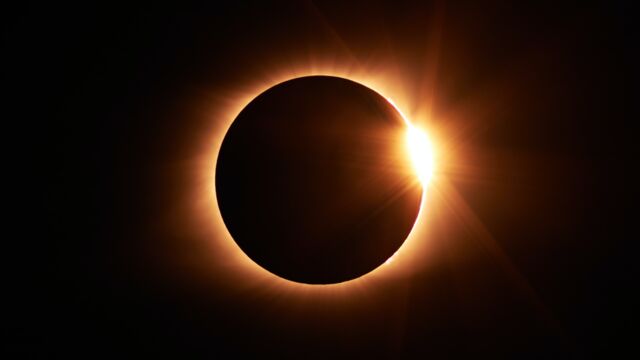Astrology fans and stargazers will be excited to know that a partial solar eclipse will be visible from the UK later this week.
Discover our latest podcast
The solar eclipse, known as an annular eclipse, will occur on Thursday morning at 10:08am UK time and will peak at 11:13am before ending around midday. So, if you want to witness this spectacular event, we suggest taking an early lunch.
What is an annular eclipse?
Annular eclipses occur once every two years when the sun and moon align with the earth. However, the moon is noticeably smaller than the sun, creating a bright halo of light, known as an annulus or a ring of fire.
The eclipse will be most visible to those in Russia, Greenland and northern Canada, but as the UK is a little further away, we will only see a crescent eclipse or partial eclipse instead of the full annulus. Dr Emily Drabek-Maunder, an astronomer at the Royal Observatory Greenwich, told PA:
This 'ring of fire' will be seen from Russia, Greenland and northern Canada. From the UK, the annular solar eclipse will be a partial eclipse, meaning that we'll only see the Moon pass in front of a small part of the Sun.
How to view the annular eclipse
Even when looking at an eclipse, we should always follow our mum’s advice: never look directly into the sun. When you look straight at the sun or any other source of bright light, the UV rays can burn the retina causing blind spots known as scotomas. This also applies when using binoculars, telescopes, telephoto lenses and sunglasses.
Instead, to get a good glimpse of the annular eclipse, you can purchase a pair of eclipse viewing glasses or special telescope filters online. Otherwise, Dr Drabek-Maunder suggests using a pinhole projector: ’You can make a projector by poking a small hole into a piece of card.
Hold the card up to the sun so that light shines through the hole and on to a piece of paper behind the card. You will be able to see the shape of the sun projected on to the piece of paper and watch its shape change as the Moon passes in front of the sun.
If that sounds a little complicated to you or you can’t get away from the office, The Royal Observatory Greenwich will be live streaming the whole event from both its website and Youtube channel.















